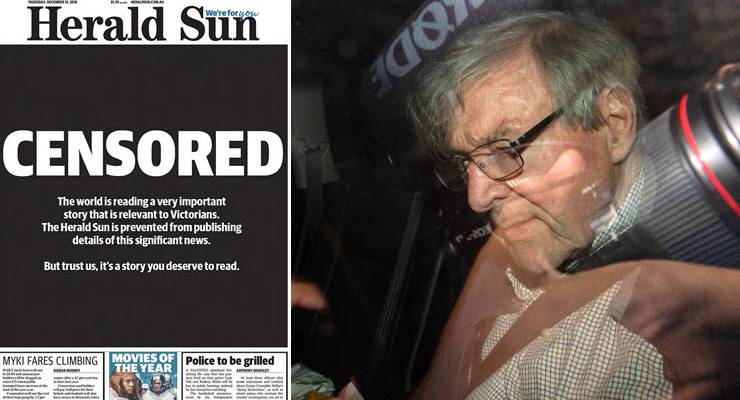
When the High Court quashed the sexual abuse convictions of Cardinal George Pell last month, it was reported as the end the biggest legal saga in our recent history.
But actually, it isn’t.
Still to come: 18 people face criminal charges as a result of the Pell matter, and the Victorian director of public prosecutions wants them found guilty and imprisoned.
Those 18 are people are prominent and senior journalists, from across the media spectrum. They include Channel Nine presenter Deborah Knight, Daily Telegraph editor Ben English, The Age editor Alex Lavelle, 2GB presenter Chris Smith, Australian Financial Review editor-in-chief Michael Stutchbury and former Courier-Mail editor Sam Weir, now at the Herald Sun.
In all, 30 organisations and people are charged with contempt of court for breaching a suppression order in December 2018 on reporting on Pell’s sexual assault trial and its outcome.
Recently, media companies pushed to get proceedings set aside, sources told Crikey. But the Victorian Office of Public Prosecutions responded with a hard no. The Office of Public Prosecutions issued a blanket decline to comment.
The case says much about what happens when proponents of free speech and the open administration of justice clash with the courts over suppression orders, contempt and defamation.
And they collide often. The relationship between the media and the law is a relationship of co-dependent dysfunctionalism with a side order of antipathy and mutual distrust. And eye-watering amounts of money.
Each day, the nation’s media turn up to court and say, “We hate your pomposity, love of procedure and starchy formality, now let us in and give us a front-page story”.
While the courts say, “We find your brash tabloid sensationalism beneath contempt, your reporting beneath our exacting standards, but because open courts are a hallmark of the justice system, we tolerate you through gritted teeth”.
The mutual antagonism escalates into conflict, whether it be over defamation, suppression or contempt, almost daily.
When the County Court jury found Pell guilty in December 2018, none of the reporters and editors charged with contempt for breaching suppression orders named Pell.
The media had agreed to the orders so as to not prejudice a planned second trial on separate charges which was later abandoned.
Enter the internet.
In the US, The New York Times and The Daily Beast reported the jury’s guilty verdict but took extraordinary steps to prevent those stories from reaching Australia.
The Times only published the story in print, and the paper stopped copies of that print edition from reaching Australia. The Daily Beast website geo-blocked the article from Australians.
But in an era of online churnalism, it wasn’t long before other sites copied the story and Facebook and Twitter were awash with news of Pell’s conviction.
So the local media reacted, running headlines that were certainly juicy.
The Herald Sun ran a dramatic black front page with CENSORED in white letters. The Advertiser’s website read: “NATION’S BIGGEST STORY: The story we can’t report”, while the Australian Financial Review reported: “Judge slams ‘flagrant’ media over world’s worst kept secret”.
Those organisations might argue they were reacting to the fact that the news was already out there, but the trial judge Peter Kidd said there was a real possibility editors could go to jail, while the Victorian DPP Kerri Judd QC, issued notices to more than 100 individuals and media companies (including Crikey), many of which were not pursued.
Twitter, Facebook and international media organisations that named Pell were not issued notices.
Media companies, starved of revenue in a COVID-19 advertising drought, have lived through a costly few years in the defamation courts.
Each big case, Rebel Wilson, Chris Gayle, Geoffrey Rush, the Wagner family, cast a long and chilling shadow over the desire of media to prosecute long and difficult stories. Some companies are self-insured for defamation, others have insurers, but often those amounts are capped.
When the Wagner family in Queensland won their defamation case against 2GB and 4BC host Alan Jones, who had made false allegations about the family’s responsibility for the 2011 Grantham floods, broadcaster Macquarie Media had to pay about $3.75 million in damages.
But the total cost to Macquarie, now owned by Nine was closer to $10 million, and not all of it was covered by its insurer Chubb.
Costs are so high that often both sides are out of pocket.
Actor Rebel Wilson won her case against Woman’s Day publisher Bauer Media, but her $4.7 million defamation payout was reduced on appeal to $600,000. That ended up costing Bauer Media about $3 million in costs and damages, but it was a Pyrrhic victory for the actress.
Due to a partially successful appeal by Bauer, and her unrecoverable costs, Wilson is estimated to be $1.2 million poorer.
The Council of Attorneys-General is making slow progress towards uniform defamation law reforms, but in the meantime, the chilling effect across the media is real.
The Pell contempt case drags itself through the Victorian Supreme Court, earning a rebuke from the judge for its slow progress.
It is due in court May 18 for another directions hearing before Dixon. A trial date might be decided soon.
A large number of the contempt charges — more than half of the original – have been scrapped, including those against 2GB announcer Ray Hadley and journalists from the ABC and Crikey.
Some lawyers feel the charges against the reporters and editors are misdirected, as while they write the stories and edit them, they don’t actually publish or broadcast them.
Costs, once again, will be astronomical, if each of the 18 people charged request a separate trial. The courts system is in a COVID-19 state of flux, with trials abandoned until next year.
And it would be a bizarre end to this long legal matter if those convicted end up being journalists found technically but not wilfully in breach of a contempt law for reporting convictions that were quashed ahead of a trial that was never held.









Crikey encourages robust conversations on our website. However, we’re a small team, so sometimes we have to reluctantly turn comments off due to legal risk. Thanks for your understanding and in the meantime, have a read of our moderation guidelines.